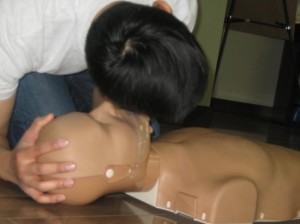Las Vegas CPR is home to the best CPR certification programs in the state of Nevada. Students are offered quality training from certified CPR trainers in high-end training facilities. Because all of the programs offered by this provider are certification courses, students all receive training credentials valid for two years once they finish their enrolled program. There are a number of CPR training programs available at Las Vegas CPR, focused on either Basic Life Support (BLS) or Advanced Life Support (ALS).

Certification for Basic Life Support
There are three BLS certification programs available at Las Vegas CPR. Two are for healthcare providers and one is for the general public. While all three award students with certificates once they pass a set of post-tests, the general public course does not require the trainees to take the exam and get certified. They can opt to simply finish all the classes and not take the post-test, which is a skills test.
BLS programs are pretty basic, focusing on skill building of proper CPR techniques. Chest compressions, rescue breaths with or without barrier devices, and defibrillation are all part of the program, performed on high-end training mannequins with high-tech equipment. While all these basics are part of each of the BLS programs, there are still differences among the three programs.
- Basic CPR with AED training – (general public) This course is a 4 hour class, completed over one day. It teaches basic CPR skills for one-person rescue and has an optional skills test to become certified. Basic first aid is also part of the program.
- Basic CPR with AED trianing (C) – (healthcare provider) This course runs longer, for 4.5 hours, and tailors basic CPR training for people who work in healthcare. It also focuses on skill building for one-person CPR rescue and has a skills test and written exam at the end to get certified.
- Basic Life Support – (healthcare provider) Also an HCP program that runs for 4.5 hours, this teaches the BLS guidelines from the American Heart Association and both one and two-person rescue. Rescuers who want to training in ACLS or PALS are required to have BLS training certificates to qualify.
Certification for Advanced Life Support
ALS programs train healthcare providers and professionals about CPR management in a hospital or similar clinical setting. The programs train students how to use a crash cart, what equipment and medications are used during a code, and the difference between managing an adult victim from a pediatric victim. Because the basics are only run through in ACLS training, rescuers are required to have BLS certification for HCPs prior to signing up and passing the pre-test (skills and written).
- Advanced Cardiac Life Support – Runs for 16 hours total, over two days. It teaches trainees how to manage adult patients, focusing on CPR for adults, adult pharmacology, and adult assessment.
- Pediatric Advanced Life Support – Runs for 14 hours total, also over two days. Unlike ACLS, this program focuses on pediatric patients. CPR for infants and young children are quite different from CPR for adults. Pediatric pharmacology and assessment is also an important part of this program.
